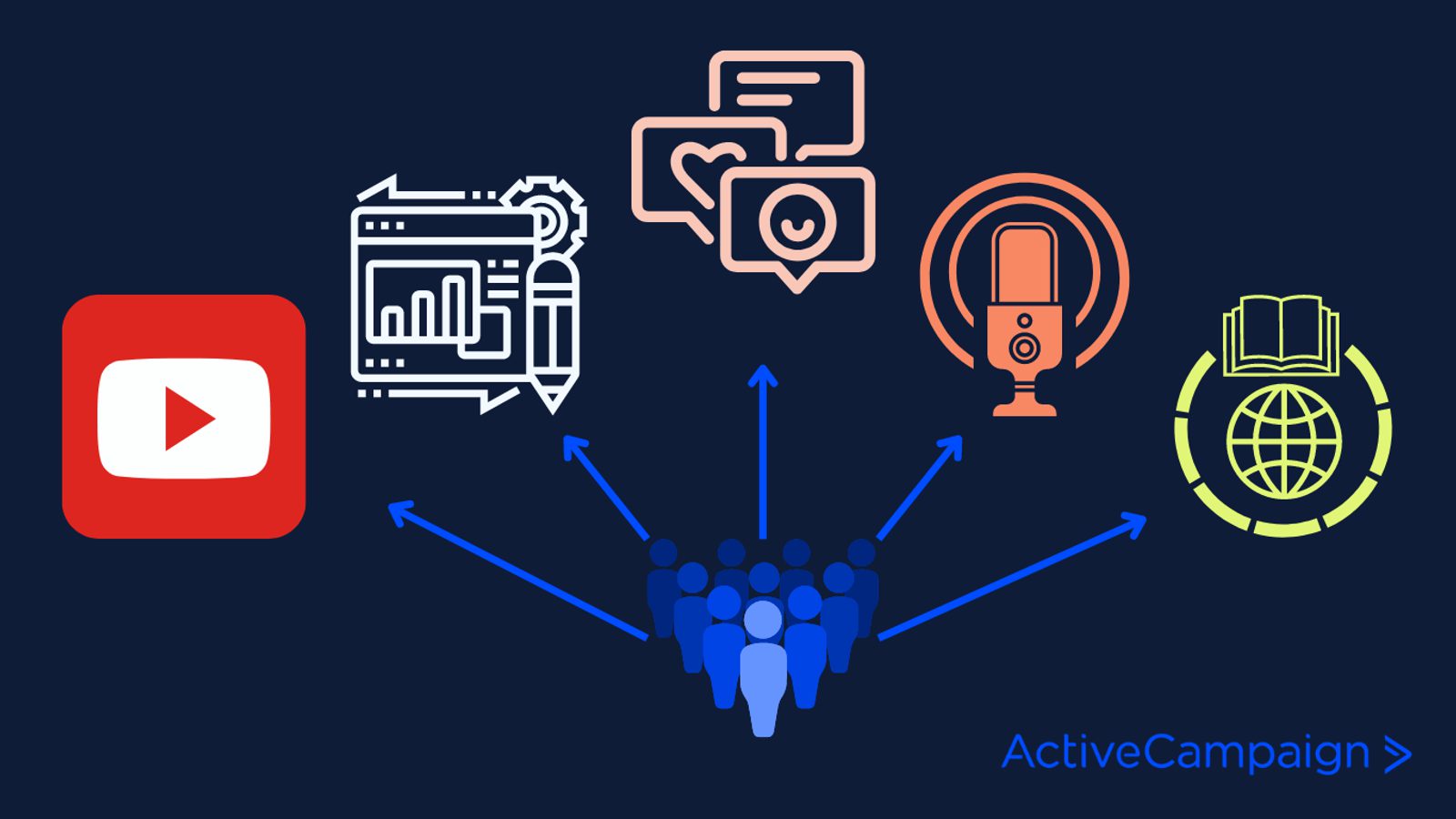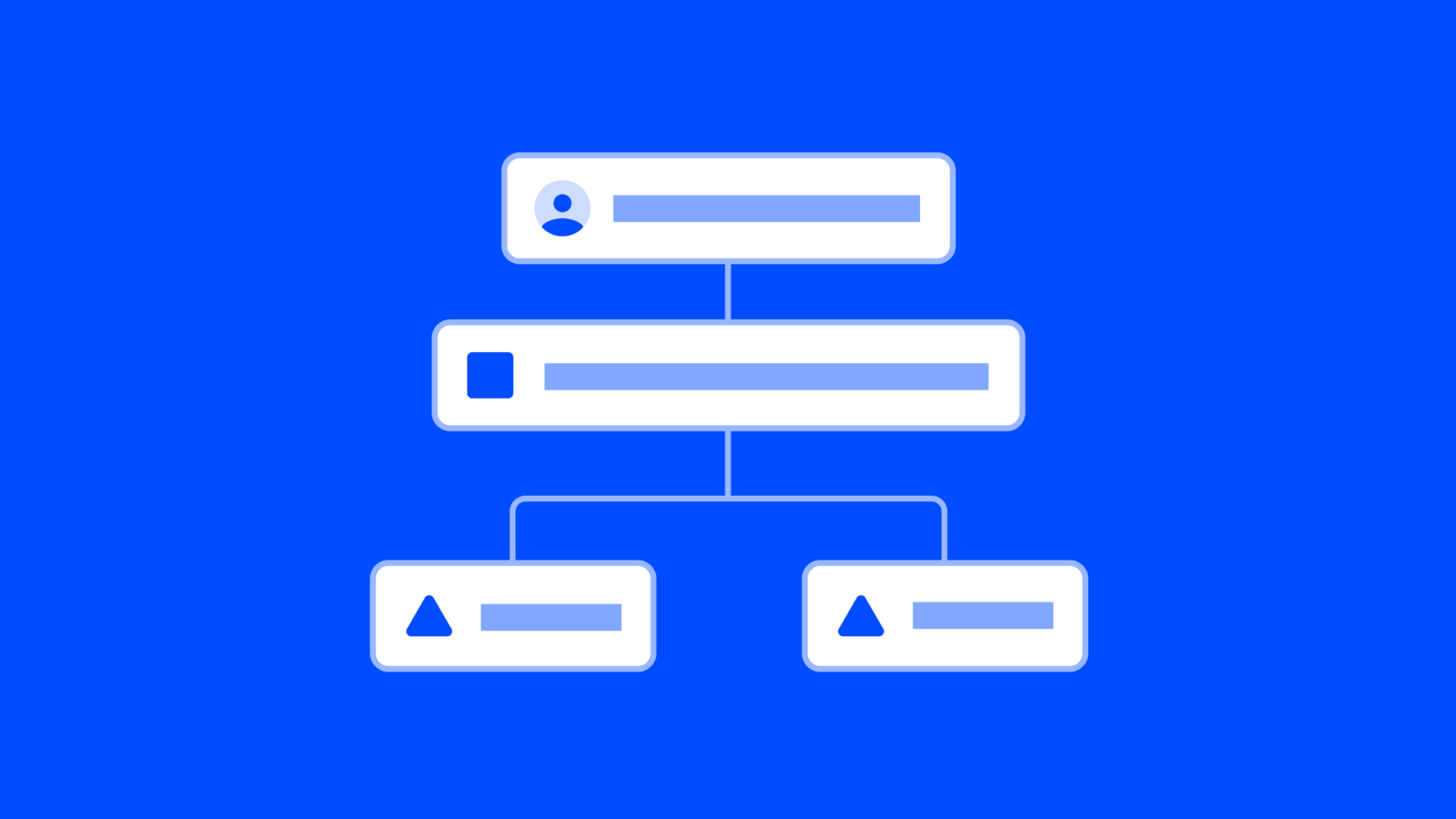Artificial Intelligence (AI) is revolutionizing the world of content creation, offering tools and capabilities that were once thought impossible.
Content creators need to understand the landscape of AI in content creation. This blog will illuminate how AI is reshaping content creation, highlighting its benefits and the shifts it brings to the industry. While the prospects are exciting, it's crucial to be aware of the challenges and nuances of integrating AI into creative processes. Whether streamlining tasks or offering new ways to engage audiences, AI's impact on content creation is profound, opening doors to new possibilities.
Heads up: This post is part of our Content Creator series that delves into essential strategies that empower content creators – from those working independently to those creating content for large organizations and everyone in between. Discover all of the resources below.
Understanding AI in content creation
AI content creation refers to the use of artificial intelligence technologies to produce or assist in generating digital content. It's increasingly relevant for modern content creators, offering innovative solutions for various tasks, from generating ideas to automating repetitive work.
AI technologies like natural language processing and machine learning are at the forefront of this transformation. These technologies empower different types of content creators in unique ways.
Content marketers, copywriters, and bloggers
For content marketers, copywriters, and bloggers, AI is a game-changer in several key areas:
Idea generation and content planning:
- AI algorithms can analyze current trends, user preferences, and competitor content to suggest relevant and engaging topics.
- Tools like topic suggestion engines help identify gaps in content strategy and propose subjects likely to resonate with target audiences.
Content production and editing:
- AI-driven writing assistants can create initial drafts or outlines, making the writing process more efficient.
- These powerful tools also assist in editing and refining original content, suggesting improvements in grammar, tone, and style.

SEO and audience analytics:
- Artificial intelligence tools excel in optimizing content for search engines, suggesting keywords, and analyzing the SEO effectiveness of articles.
- They can also analyze audience data, providing insights into content performance and reader preferences, which is crucial for tailoring future content strategies.
Content creators can leverage these AI capabilities to save time and improve the quality and relevance of their content, making it more appealing to their audience and search engines. The key is to use AI as a complement to human creativity, enhancing the content creation process without losing the personal touch that readers value.
Streamers and YouTubers
For streamers and YouTubers, AI is revolutionizing the way they create and manage their video content:
Advanced video editing:
- AI-driven video editing software can automate tedious aspects of video production, such as cutting, aligning, and optimizing audio levels, allowing creators to focus on creative aspects.
- Some AI tools even suggest edits based on viewer engagement metrics, helping to create more captivating and high-quality content.
Video recommendation optimization:
- AI algorithms analyze viewer behavior to optimize video recommendations, enhancing content visibility and reach.
- These tools can help creators understand what content performs best, guiding future video topics and styles.
Understanding viewer preferences:
- AI helps analyze viewer data, providing insights into preferences and viewing patterns.
- This information is crucial for tailoring content to audience tastes to improve engagement and subscriber growth.
By incorporating AI into their workflow, streamers and YouTubers can improve the quality of their content and gain deeper insights into their audience, helping them create more engaging and successful videos.
Podcasters
For podcasters, AI technology offers valuable tools to enhance their content and workflow:
Audio editing assistance:
- AI can automate the editing process, efficiently handling tasks like noise reduction, equalization, and volume leveling. This saves time and improves the overall audio quality.
- Some AI tools can even detect and remove filler words or long pauses, making episodes more concise and listener-friendly.
Efficient transcription services:
- AI-powered transcription services can quickly convert audio episodes into written content. This aids in creating show notes, blog posts, or even subtitles for video podcasts.
- Accurate transcriptions make content more accessible and improve SEO for podcast episodes.
Analyzing listener trends:
- AI can analyze listener data to identify trends and preferences, guiding podcasters on topics, episode length, and posting frequency.
- Understanding listener behavior through AI analytics helps create content that resonates more deeply with the audience.
Incorporating AI into podcast production streamlines the technical aspects and provides insights into audience engagement, aiding podcasters in tailoring their content for maximum impact.
Check out our free podcasting strategy template to start building yours from scratch.
Educational content creators
For educational content creators, AI offers significant advantages in enhancing learning experiences:
Personalization of learning material:
- AI can analyze student performance data to tailor educational content. This could mean adjusting the difficulty level or focusing on specific areas where students need more help.
- By considering different learning styles, AI can suggest various teaching methods, such as visual aids for visual learners or interactive quizzes for kinesthetic learners.
Creating interactive and adaptive learning experiences:
- AI can create dynamic, interactive content that adapts to student responses, providing a more engaging and effective learning experience.
- This includes simulations, educational games, and interactive quizzes that react to the learner's progress, keeping them challenged and interested.
Incorporating AI into educational content creation allows for a more tailored and responsive learning journey, making education more accessible and effective for diverse learning needs.
Evolution of AI tools in content creation
The evolution of AI tools in content creation is a fascinating journey, transforming them from simple task automation to key creative partners. This section explores how AI has progressed to provide complex creative assistance and revolutionize content creation methods.
From automation to creative collaboration:
- Initially, AI tools in content creation focused on automating repetitive tasks, such as data analysis or basic content generation.
- Over time, these tools have advanced to become collaborative partners in the creative process.
Complex creative assistance:
- AI now aids in generating innovative ideas and concepts, drawing from vast data sources for inspiration.
- It provides deep, data-driven insights that can effectively inform content strategy and target audience preferences.
Participation in the physical creation of content:
- Advanced AI tools assist not just in planning and strategizing but also in the actual creation of content, such as writing articles, scripting videos, or designing visuals.
- AI's role in the physical creation of content has opened new avenues for efficiency and creativity, reshaping how content is produced.
Implications for content creators:
- This technological evolution brings both opportunities and challenges. Content creators can leverage AI for enhanced productivity and creativity.
- However, adapting to these tools requires a learning curve and an understanding of how to integrate AI into the creative process effectively.
The rapid development of AI in content creation tools signifies a major shift in the industry, transforming how creators approach their work and engage with their audience.
The benefits of AI in content creation
The advent of AI has brought about transformative benefits that are reshaping how both short-form and long-form content is developed and delivered. This section delves into AI's numerous advantages to content creators, from enhancing operational efficiency to spurring creative processes and tailoring content to individual audience needs.
As we explore these benefits, we'll also highlight how platforms like ActiveCampaign harness AI to bring a new level of precision and personalization to content strategies.
Increased efficiency
Generative AI has revolutionized the efficiency of the content creation process in several key ways:
- Time-saving on repetitive tasks: AI excels in handling repetitive, time-consuming tasks that are a part of the content creation process. For instance, AI can automate the process of data collection, keyword research, and even basic structuring for a piece of content. This automation significantly reduces the time spent on these tasks, allowing content creators to focus more on creative aspects.
- Streamlining workflow: AI content tools often come with features that streamline the workflow. They can quickly analyze large volumes of data, provide insights, and even suggest content improvements based on trends and analytics. This saves time and makes the process more efficient by offering data-driven suggestions and strategies.
- Enhancing productivity: AI enables content creators to be more productive by taking over routine tasks. They can create more content in less time, with AI handling aspects like SEO optimization, content formatting, and even ensuring that the content meets certain quality standards. This increased productivity is a significant advantage in a field where content must constantly be updated and refreshed.
Overall, AI in content creation represents a shift towards more efficient, data-driven, and productive workflows, allowing content creators to allocate their time and resources more effectively.
Enhanced creativity
AI's role in enhancing creativity in content creation is multifaceted and impactful:
- Idea generation: AI tools can suggest creative ideas and topics by analyzing current trends, user interests, and past successful content. This capability helps content creators break free from creative blocks and explore new avenues they might not have considered.
- Content formatting and styling: AI can also help determine the most effective formats and styles for content. By analyzing user engagement across different content types, AI provides insights into what formats resonate with audiences, enabling creators to tailor their work more effectively.
- Drafting and editing assistance: AI's ability to draft and edit content accelerates the creative process. AI-powered tools can produce initial drafts, suggest improvements, and even help with language and grammar. This assistance allows creators to focus on refining and adding a personal touch to the content rather than getting bogged down with initial drafts and basic editing tasks.
Overall, AI's contribution to enhanced creativity in content creation lies in its ability to offer new perspectives, streamline formatting, and assist in the initial creation stages, empowering creators to produce more compelling and relevant content.
Personalization and targeting with AI in content creation
AI's ability to analyze data for content personalization and targeting is a game-changer in the field. It starts with an in-depth understanding of audience behaviors and preferences, which AI does by analyzing interaction data, social media posts, and user feedback. This analysis allows AI to identify patterns and preferences, making it possible to create content that resonates with specific audience segments.
- Tailoring content: AI uses the derived insights to tailor content to different audience groups. For example, it can suggest topics, tone, and formats that align with the interests of particular audience segments.
- Enhanced engagement: AI significantly increases engagement rates by delivering personalized content. Audiences are more likely to interact with content that feels relevant to their interests and needs.
ActiveCampaign and AI-powered personalization
ActiveCampaign utilizes AI for sophisticated audience targeting and content relevance. Its features include:
- Advanced segmentation: AI helps segment your audience based on behaviors and preferences, enabling more targeted content delivery.
- Behavioral-based email automation: AI tracks user behaviors to trigger relevant emails, ensuring each message aligns with the user's interests and actions. (We also have a dedicated blog post about AI in email marketing if you are interested).
- Detailed reporting: ActiveCampaign’s AI-powered analytics provide deep insights into audience interactions, helping content creators understand what works and refine their strategies accordingly.
Incorporating ActiveCampaign’s AI features into a content creator's workflow means benefiting from a system that understands the audience and responds dynamically to their evolving preferences, elevating content strategy to new levels of precision and effectiveness.
Balancing AI and human creativity in content creation
The harmonization of AI and human creativity in content creation is key to producing compelling and genuine content. This section delves into how content creators can strike a perfect balance between leveraging AI for efficiency and infusing human creativity for authenticity and originality. It's about blending the best of both worlds to produce content that truly engages and resonates with the audience.
AI as a foundation in content creation
AI's emergence in content creation marks a significant shift in how initial ideas and drafts are formed. It excels in conducting research, brainstorming concepts, and laying out the first draft of content. These tasks, often time-consuming, can be streamlined using AI, thus freeing up creative minds for more intricate tasks. This foundational role of AI is invaluable, yet it's crucial to recognize its limits in capturing the nuanced understanding and emotional depth that human creativity brings.
The imperative of human touch
The essence of engaging content lies in its authenticity and connection with the audience, elements that AI alone cannot fully grasp. While AI can start the process, human intervention is critical to refine and elevate the content. This involves infusing personal insights, experiences, and a unique voice into the AI-generated drafts. It's this human touch that transforms generic AI output into compelling, brand-aligned content that resonates with the audience.
The crucial role of editors
Editors and copywriters play an indispensable role in sculpting AI-generated content into polished, effective communication. They ensure that the content aligns with the brand’s voice and goals and is contextually relevant and engaging for the target audience. Their expertise in fine-tuning the nuances and subtleties of language is vital in enhancing the quality and impact of the content. This step is key in avoiding generic, uninspiring content that can detract from the brand’s reputation and audience engagement.
AI and human writers
Viewing AI as a collaborative tool rather than a replacement for human creativity is essential. It’s about striking a balance where AI provides a starting point, and human creativity adds depth, emotion, and authenticity. This collaboration leads to innovative content that reflects a harmonious blend of efficiency, creativity, and human insight. By leveraging AI’s strengths in data handling and initial creation, and combining them with human expertise in storytelling and emotional appeal, content creators can craft messages that truly connect with their audience.
The interplay of AI and human creativity in content creation is a dance of efficiency and emotion. While AI sets the stage with its ability to handle data and draft initial content, the human element is indispensable in creating content that truly resonates with the audience and represents the brand’s voice. This balanced approach leads to content that is not only innovative but also authentic and emotionally engaging.
Overcoming challenges in AI content creation
Navigating the challenges of AI in content creation is crucial for maintaining quality and ethical standards. Common obstacles include the potential for AI-generated content to lack originality or ethical concerns surrounding data use and content authenticity. By understanding these challenges, content creators can take steps to ensure their AI-assisted content remains both ethical and engaging.
Ethical considerations and authenticity
The use of AI in content creation raises important ethical questions, particularly regarding data privacy and the authenticity of the content produced. AI tools often rely on large datasets, which can lead to concerns about the ethical sourcing and use of this information.
Furthermore, there's a risk of AI-generated content lacking the unique voice and perspective that human creators bring. This section explores strategies to navigate these ethical considerations, emphasizing the importance of transparency in data use and combining AI with human oversight to ensure content authenticity.
Solutions and best practices
Navigating AI in content creation presents unique challenges and opportunities. This section explores practical solutions and best practices to manage these challenges effectively. By understanding and implementing these strategies, content creators can harness AI's full potential while maintaining their work's integrity and authenticity. Let's delve into these actionable insights.
- Regular model updates: This may or may not apply to you, depending on what tools you use, but it’s important to keep your AI tools up-to-date with the latest data and algorithms to ensure content remains fresh and relevant.
- Human-AI collaboration: Combine AI-generated content with human editing and creativity to add a unique touch and ensure authenticity.
- Transparency in AI usage: Clearly communicate the use of AI in content creation, maintaining openness about how AI tools are used and the data they rely on.
- Ethical data practices: Adhere strictly to ethical data collection and use standards, respecting privacy and avoiding biased or insensitive content.
- Continuous learning and adaptation: Stay informed about the evolving AI landscape, learning new tools and techniques to improve content quality and effectiveness.
- Audience feedback integration: Regularly seek and integrate audience feedback to guide AI content creation and ensure it meets user expectations.
- Diversified content strategies: Avoid over-reliance on AI by employing diverse content strategies, including both AI-generated and traditionally created content.
By implementing these practices, content creators can effectively navigate the challenges of AI, producing high-quality, ethical, and engaging content.
Preparing for an AI-driven future in content creation
Staying on top of AI advancements is essential for every content creator. In this rapidly changing environment, understanding the latest developments in AI can unlock new levels of creativity and efficiency.
We encourage content creators to always be aware of the latest information on AI technologies, trends, and tools. Being well-informed about AI's potential and ongoing evolution ensures that creators can adapt their strategies effectively, harnessing AI's power to enhance their work and stay competitive in an increasingly AI-driven world.
Adapting and learning new AI tools and technologies
We are in an era of rapid technological advances, more than any other point in history. This is why the significance of adapting to new tools and technologies in content creation cannot be overstated. As AI becomes more integral to various creative processes, learning how to utilize these tools effectively is crucial for content creators.
- Embracing change: The digital landscape and the tools and technologies used in content creation are constantly evolving. It is vital to embrace change and be open to learning new methods. This adaptability not only keeps content fresh and relevant but also opens doors to innovative ways of storytelling and audience engagement.
- Staying competitive: In a field as dynamic as content creation, staying competitive often hinges on how well you leverage new technologies. AI offers a range of tools that can give creators an edge, from automated content suggestions to sophisticated data analytics. Understanding and utilizing these tools can significantly enhance the quality and impact of content.
- Continuous learning: The journey with AI in content creation is one of continuous learning. Platforms and tools are always updated, and new technologies are frequently introduced. Dedication to lifelong learning ensures that creators can keep up with these changes and incorporate the best practices into their content strategies.
- Experimentation and innovation: Adapting to new AI tools encourages experimentation. Trying out different technologies can lead to unexpected and innovative content solutions, pushing creative boundaries and possibly setting new trends in the industry.
- Future-proofing your skills: As AI becomes more entrenched in content creation, the skills to use these tools effectively will become increasingly valuable. Staying ahead of the curve prepares you for the current digital landscape and future-proofs your skills for whatever new advancements may come.
In conclusion, adapting and learning new AI tools and technologies are not just about keeping up with the trends; it's about setting yourself up for ongoing success in an ever-evolving content creation landscape.
The future of AI and content creation
As AI continues to revolutionize the content creation landscape, speculating on future trends and possibilities becomes an exciting exercise in foresight and creativity. Here are some projections into the realm of AI-driven content creation:
- Advanced customization: AI's ability to analyze data will reach new heights, offering unprecedented content customization. We can expect AI systems to tailor content based on audience demographics and nuanced emotional and psychological profiles, creating highly personalized user experiences.
- Enhanced collaborative AI: Future AI tools will likely function more as creative partners rather than just assistants. They could suggest content ideas and assist in the creative process, contributing original concepts and designs.
- Immersive experiences with VR/AR: Integrating AI with Virtual Reality (VR) and Augmented Reality (AR) technologies could lead to highly immersive content experiences. AI could generate dynamic, interactive worlds for education, entertainment, and marketing, offering personalized narratives and environments.
- Ethical AI development: As AI becomes more integrated into content creation, there will be a stronger focus on ethical AI development. This includes transparent algorithms, unbiased content generation, and respectful data usage, ensuring AI's role in content creation aligns with ethical standards.
- AI in content strategy and decision-making: AI will play a more significant role in strategic decision-making by analyzing trends, predicting content success, and advising on content strategy.
These speculative trends paint a picture of an AI-driven future where content creation is more personalized, immersive, ethical, and strategically informed, presenting exciting opportunities and challenges for creators.
Ready to get started with AI content creation?
In this journey through AI and content creation, we've uncovered AI's transformative power in revolutionizing how content is crafted. From enhancing efficiency and creativity to providing personalized content, AI is reshaping the content creation process.
However, balancing AI with human creativity is vital to maintaining authenticity and originality. As we step into an AI-driven future, staying informed and adapting to new technologies is crucial. Content creators are encouraged to explore AI's potential, particularly using tools like ActiveCampaign's AI content generator.
Ready to embrace the future? Start your AI content creation journey with a free trial of ActiveCampaign today.







